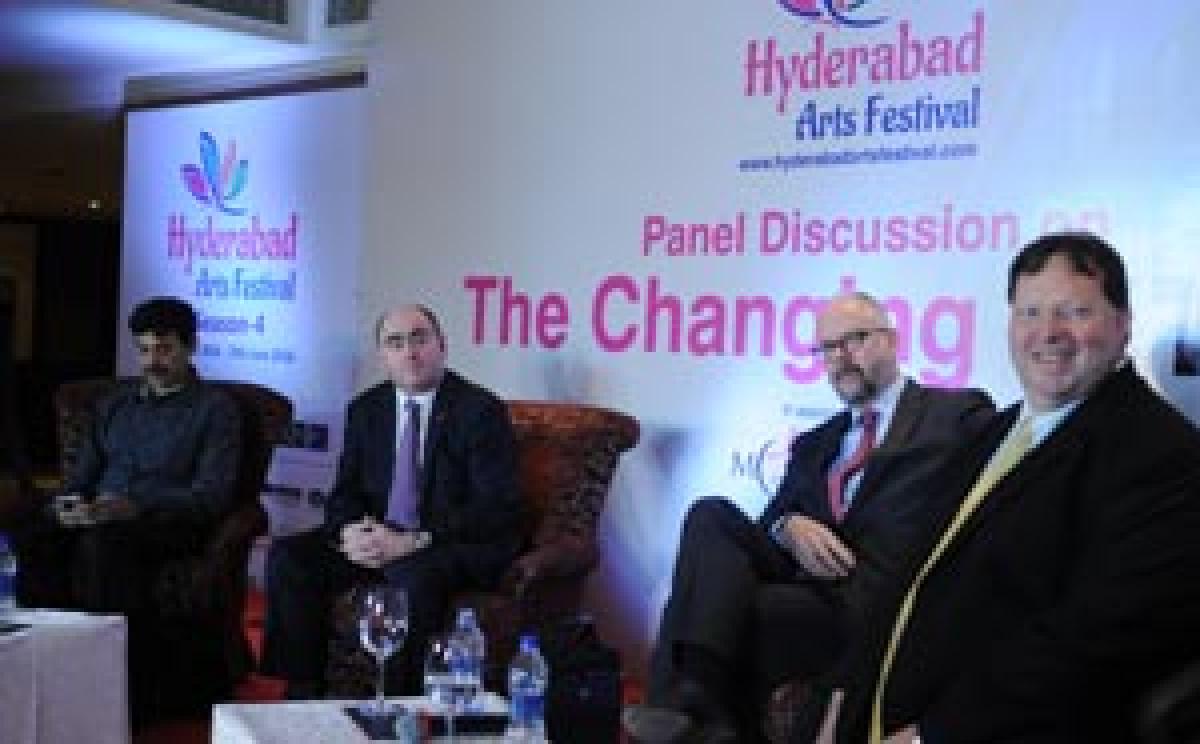Live
- WI vs Bangladesh Watch Controversial Banter Between Shakib and King
- EFLU Celebrates Bharatiya Bhasha Diwas
- Manchu Manoj Submits Bond of Rs. 1 Lakh to Rachakonda Commissioner
- Cuba denounces US 'theft' of Havana Club rum trademark
- Places of Worship Act: Mathura Shahi Eidgah mosque files intervention application in SC
- Violence erupts during 'Parbhani bandh'; MVA flays sacrilege to Ambedkar statue
- Addressing ethical challenges of AI, making social media accountable on fake news: Ashwini Vaishnaw
- Assam Congress to hold three-day review meeting to discuss bypoll debacle
- Indian pharma companies set to make further progress in US market in 2025: HSBC
- High Court Grants Relief to Mohan Babu, Orders Surveillance at Residence
Just In

Hyderabad Arts Festival’s panel discussion on ‘The Changing Cities’ had Jayesh Ranjan, Secretary ITE&C Dept; Andrew McAllister, British Deputy High Commissioner; Michael Mullins, Consul General of the US Consulate General and Achim Fabig, Consul General at the German Consultate General sharing experiences of dealing with development clashing with culture.
With an objective to show the importance of culture and heritage of fast growing cities, Hyderabad Arts Festival organised a panel discussion titled ‘The Changing Cities’
Hyderabad Arts Festival’s panel discussion on ‘The Changing Cities’ had Jayesh Ranjan, Secretary ITE&C Dept; Andrew McAllister, British Deputy High Commissioner; Michael Mullins, Consul General of the US Consulate General and Achim Fabig, Consul General at the German Consultate General sharing experiences of dealing with development clashing with culture.
Achim Fabig shared his experience with the city, “Hyderabad is changed with IT boom from last 25 years. A recent survey said that the people in this city want to overcome problems of pollution, transportation and they are looking for transparency in government policies. In Germany, people always are looking to live in smaller cities.”
“The changes in any city depend on its ethnic groups, arts and cultural behaviour. During 1970’s and 80’s, Boston city was referred to as warehouse area, and later on it developed with co-operation from people and became the fourth largest tourist city in the world,” said Michael Mullins, US Consulate General.
Michael Mullins and along with other panelists felt that buildings alone will not make cities. It is the people, who will make a difference. Community engagement in the growth of the cities is very important. Let people be part of the changes of the city. It is those cities who engage communities in their growth that will last long, they observed. People are the change and they must be made part of the change, they opined.
“The rulers of Hyderabad had provided great culture for us. The Nizams encouraged Sufi and Qawwali culture. We have large population that includes people from different ethnicities and languages. Hyderabad is a tolerant and inclusive city. Highest aspect of Telangana is the insertion of diversity in Hyderabad,” said Jayesh Ranjan, Secretary ITE&C Department.
He also added that it is a difficult task to our politicians to concentrate on culture because they have to focus on other aspects like agriculture. Andrew McAllister, British Deputy High Commissioner, said, “London is a city of having different diversity living together. Parks and museums plays key role in reflecting cities with great culture.”
Responding to audience, who asked the panelists if they know of any committee to protect basic aesthetics of the city, Jayesh Ranjan said there is a need for such committees. But, for that to happen it will take a long time as critical mass which needs to bring in that change is not there.
Collectively they agreed that replacing old iconic structures with newer ones in a quest to brand and market cities won’t work. Instead, it was suggested to go for adaptive reuse, so that iconic monuments not only will last long, but continue to serve people.

© 2024 Hyderabad Media House Limited/The Hans India. All rights reserved. Powered by hocalwire.com







